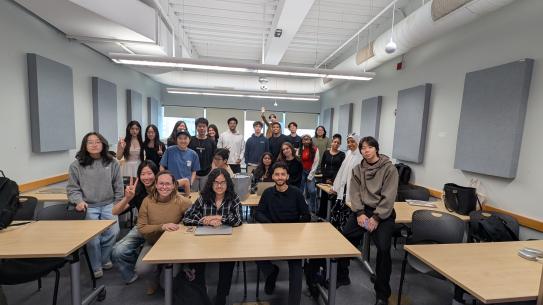Cameron Bedard becomes NYU Tandon’s first Truman Scholar

The Truman Scholarship, awarded by the Harry S. Truman Scholarship Foundation, is widely considered to be among the most prestigious recognitions an aspiring public service leader in the U.S. can receive. Past Truman Scholars have gone on to serve in the legislature, hold high-level judicial appointments, head nonprofit groups, and take on other important posts
“Resourceful, patriotic leaders, today’s Truman Scholars would make President Truman proud,” says Terry Babcock-Lumish, the Truman Foundation’s executive secretary. “Rising to meet their moments in this century as he did his in the 20th century, they are dedicated public servants who do not shy from challenge.”
This year, Cameron Bedard, a member of the Class of 2025 who has remained to earn his master’s degree in Computer Engineering, became Tandon’s first-ever Truman Scholar.
We caught up with him to learn more about his background, time at Tandon, and future plans.
When did you first become interested in STEM?
I’ve always known I wanted to be involved in engineering. I was one of those five-year-olds reverse-engineering my toys and asking for LEGO kits. I went to a small public school in Deerfield, New Hampshire, which is a relatively rural place with only about 3,000 residents. There was no organized science club, so when I was in middle school, my mother got permission to launch one.
My parents were both very supportive of my interests. My mother was a full-time member of the New Hampshire Army Guard, and my father was in the Army Reserves and also worked as a biomedical equipment technician at a local hospital. When I was deciding what path to take after high school, the military seemed like a natural choice because of their positive experience.
I decided on the Air Force because I knew I would leave there with good technical skills and job prospects.
What did you do in the Air Force?
I was an Avionics Technician, which means that I maintained and repaired C-130 Aircraft. I started off in Texas for about eight months, and then I was assigned to a unit based in Arizona.
That unit held the record for the longest continuous deployment in the U.S. Air Force — almost 20 years. I completed two deployments, Afghanistan in 2019, and the United Arab Emirates in 2021.
I assisted with refugee evacuation in the 2021 Afghanistan withdrawal and left the military in 2022, at the rank of Staff Sergeant with two Air Force Achievement Medals
What did you do next?
The Air Force has a program that provides you with an internship as you start your transition out of the military, to prepare you for civilian life and the civilian workforce. I worked at a Tucson-based optical engineering company called NP Photonics, which is a fiber laser design and manufacturer, as well as a glass fiber manufacturer. I worked alongside the Project Manager and an Optical Design Engineer on a laser device to treat intractable kidney stones.
I had completed most of the Gen Ed courses at Pima Community College while I was in the U.S. Air Force, so I was ready to earn a bachelor’s degree when I got out. I wanted to study computer engineering, and I was lucky enough to get admitted to NYU Tandon. I earned my B.S. in 2025, and I’m remaining to earn my M.S.
You became active in the NYU Student Veterans Association. Tell us about that.
I served as vice president from 2023 to 2024 and then president the following year. Sometimes veterans get socially isolated on college campuses because we’re older than most students; there’s also the problem of finding one another, since a lot of veterans end up keeping their service private for various reasons. Additionally, if someone is not engaging with NYU’s veteran community, we could have no clue whether they’re a veteran or not. So the mission of NYU’s Student Veteran Association is to bring veterans into the fold, give them a space to be themselves, and provide support.
One of the biggest events we had recently was a panel of veterans, most of them NYU alumni, who discussed various post-military career paths. They weren’t all what you might think; one participant had founded his own theater troupe, for example.
What projects did you take part in as an undergraduate?
I took part in two Vertically Integrated Projects: Processor Design, where we work to design chips using an open-source architecture, and Robotic Design, which involves building an autonomous rover capable of mining regolith on the moon and taking part in NASA’s annual Robotic Mining Competition.
I also worked in Giuseppe Loianno’s Agile Robotics and Perception Lab. Associate Professor Loianno works with drones, developing new algorithms to allow them to navigate more successfully. In the course of trial runs, they sometimes get damaged, and my job was to fix them. I loved it, because it allowed me to apply the skills I had picked up from working in aircraft in the military.
I also worked with Industry Associate Professor Matthew Campisi on a wearable to help detect Parkinson’s disease; that really resonated with me because my grandfather had Parkinson’s, and since it’s genetic that puts other family members at risk.
Outside of Tandon, in mid-2024, I earned a research fellowship at Yale University’s Intelligent Autonomy Lab. That was part of a Yale program called Research Experience for Veteran Undergraduates (REVU), and my project focused on embedded systems for advanced tasks in edge case robotics.
What are your plans going forward?
I’m most interested in developing wearables for health diagnostics, and I foresee joining the public sector or a specific industry after earning my master’s.




